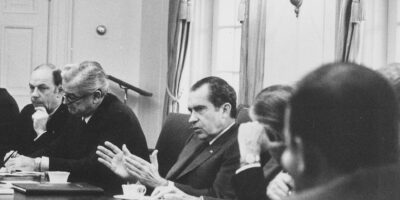A Second National Lockdown is Dangerous and Reckless

On Wednesday, November 11, CNBC reported that Dr. Michael Osterholm, a member of Joe Biden’s Covid-19 task force, suggested that the United States should enact a 4-6 week lockdown, stricter than any imposed before.
CNBC writes
“Shutting down businesses and paying people for lost wages for four to six weeks could help keep the coronavirus pandemic in check and get the economy on track until a vaccine is approved and distributed, said Dr. Michael Osterholm, a coronavirus advisor to President-elect Joe Biden.”
This idea was pitched in response to expected spikes in Covid-19 cases in the coming months. Osterholm’s reasoning included
“A nationwide lockdown would drive the number of new cases and hospitalizations down to manageable levels while the world awaits a vaccine, he told Yahoo Finance on Wednesday.”
Not only does Osterholm call for a nationwide lockdown, overriding the discretion of state governors, but he also has a deep skepticism towards the merits of federalism. He stated in reference to an op-ed he wrote with Minneapolis Federal Reserve President Neel Kashkari that,
“The problem with the March-to-May lockdown was that it was not uniformly stringent across the country. For example, Minnesota deemed 78 percent of its workers essential,” (Osterholm and Kashkari) wrote in the New York Times. “To be effective, the lockdown has to be as comprehensive and strict as possible.”
So not only does Osterholm wish to reinstate the nightmare of lockdowns more strictly than ever, he doesn’t see why local officials should be allowed to experiment with different policies and make solutions tailored to their needs.
Not only does this proposal seem to come off as tone deaf, but it also has little basis in evidence and seems to neglect the lessons learned from the world’s experiment with lockdowns. Furthermore, such a proposal falls dangerously short of having any sort of basis in economics or civics.
A Strict and Uniform Lockdown Has Little Merit and Could Be Illegal
The idea that the United States government should institute a national lockdown mandate that overrides the discretion of local officials is rooted in a simplistic view of society. Although in theory, it may be advantageous to have uniform restrictions, the United States is too diverse. Such a policy would be dangerous and cause unnecessary disruption. Why should citizens in Utah, which has some of the lowest deaths per capita, abide by the same restrictions as those in New York, which has one of the highest deaths per capita? Such a suggestion is a recipe for a highly avoidable disaster.
Osterholm takes particular issue with the idea that in some states too many workers were deemed essential. The entire notion that certain businesses are essential or nonessential is not only ignorant of the complex ecosystem that is the economy but could damage the healthcare sector. For example, in Michigan the Mackinac Center reports,
“One of the affected medical practices, Grand Health Partners, operates in the Grand Rapids area. It performs endoscopies and other elective surgeries, many of which were deemed nonessential by executive order. Due to the shutdown, many of their patients were not able to receive treatment and have suffered because of it.”
Furthermore, shutting down businesses and schools will not only send disruptive economic shockwaves but it will also affect healthcare practices needed to combat Covid-19. Jude Bayham and Eli P. Fenichel write in an academic paper on school closures that
“School closures come with many tradeoffs. Setting aside economic costs, school closures implemented to reduce COVID-19 spread create unintended childcare obligations, which are particularly large in healthcare occupations.”
Disruptions caused by another, far stricter lockdown will likely impose unexpected burdens on healthcare workers that will weaken the ability of hospitals to treat patients, not just for Covid-19 but all diseases.
Alongside the massive economic, social, and health-related consequences of a national lockdown order of this magnitude, it might be illegal. In a past article, I highlight that three states (Michigan, Wisconsin, and Pennsylvania) had their lockdowns declared unconstitutional. It would not be surprising if a national lockdown as Osterholm favors would violate all sorts of laws and doctrines. That could include but not be limited to, the 1st Amendment, the 14th Amendment, and the Separation of Powers doctrine.
Lack of Theoretical Basis
Lockdowns have yet to be proven as an adequate policy for mitigating pandemics. The late Dr. Donald Henderson, famous for leading the worldwide eradication of smallpox, wrote the following in 2006,
“There are no historical observations or scientific studies that support the confinement by quarantine of groups of possibly infected people for extended periods to slow the spread of influenza.”
Henderson writes the following about prohibiting large social gatherings:
“During seasonal influenza epidemics, public events with an expected large attendance have sometimes been canceled or postponed, the rationale being to decrease the number of contacts with those who might be contagious. There are, however, no certain indications that these actions have had any definitive effect on the severity or duration of an epidemic.”
Furthermore, a recent study published by The Lancet concluded that there is no definitive evidence that can prove the effectiveness of various public health interventions in combating Covid-19.
We have learned Dr. Henderson’s lesson the hard way unfortunately as public health interventions have failed to produce intended results while causing tremendous social strife.
Finally, Osterholm makes the following remark about economic policy
“We could pay for a package right now to cover all of the wages, lost wages for individual workers for losses to small companies to medium-sized companies or city, state, county governments. We could do all of that,” he said. “If we did that, then we could lockdown (sic) for four-to-six weeks.”
Although we should compensate citizens in response to lockdowns, the economic effects of this proposal, ranging from utter chaos in the business sector to a possible monetary meltdown would be immeasurable.
Key Takeaways
The United States is not ready for another round of lockdowns, especially the ones that Dr. Osterholm is suggesting. Some states refused to issue lockdowns, like Utah, and have fared better than the rest of the country, and some states like New York issued a lockdown and had some of the worst results. Many people are also getting tired of voluntarily following guidelines.
To say that now the entire country should enter a 4-6 week shutdown stricter than all that came before is not only tone deaf but reckless.
Such a policy will likely have untold consequences that go beyond economic devastation. It will likely cause more fatalities as patients of all ailments are unable to adequately seek healthcare. Suicides, substance abuse, and social turmoil have been exacerbated as a result of lockdowns, and they will only worsen under this new policy.
Finally, all of this will likely be in vain as there is still little evidence to confirm definitively that these policies will work as advertised. If anything, the idea that the country simply needs an extra strict lockdown is a low effort proposal. One that seeks to punt the burden of effort from the government to its citizens. More of a cop-out instead of mobilizing to devise strategies to increase hospital capacity, protect the most vulnerable, improve testing, and provide adequate information. A competent and reasonable Biden administration would be best served to accomplish these objectives and not issue a lockdown.










